An Elderly Wish Foundation’s annual Heart to Heart fundraiser will be a virtual “Gala to Go” this year
Thursday, January 28th, 2021


Rick Carraher and his beloved El Campanil Theatre. Photos courtesy of El Campanil Theatre Preservation Foundation.
By Allen Payton
Earlier this month, Rick Carraher, long-time executive director of the historic El Campanil Theatre in Antioch’s downtown Rivertown announced the third retirement in his life by posting the following message on the theater’s website:
“Dear employees, volunteers, and friends of El Campanil Theatre:
For over 19 years, I have had the pleasure to steer the historic El Campanil Theatre to become the grandest and most state-of-the-art performing arts venue in Eastern Contra Costa County. Now, at the age of 72, I will step down from the leadership role as Executive Director.
I have committed myself to the revitalization of downtown Antioch. After 18 years at Bank of America, my wife Janis and I opened and operated Rick’s on Second for 25 years. I recall the day in 2001 when Nordyn Anderson and I were having a cup of coffee while looking at El Campanil Theatre across the street. We both agreed that there was a need to bring vitality to the downtown and the theatre was likely to provide that focus. After creating an interest group of local residents, it was clear that there was a need for a place for families to come together and enjoy live entertainment of all kinds.
I’m so proud of what El Campanil Theatre has become over the years. The number of people who attend events on an annual basis reinforce the opinion that El Campanil is the cornerstone of the continuing process toward the revitalization of Rivertown.
I believe that we are now at a point where we need to strengthen our focus to the needs of the youth of the community, and Joel Roster brings that passion with him. When we are permitted, we will continue to bring quality entertainment that appeals to all ages.
I am so happy that we found someone with an amazing love of theatre. Joel’s enthusiasm is so apparent and he is determined to make El Campanil Theatre the center of performing arts and education in the region.
Joel strives at all times to keep in pace with every new development. His attitude has never been, “oh, we can’t do this anymore”, but rather “what can we do?”, and I think that’s been life-saving.
The past 19 years have been very rewarding – to myself as well as the community – and I am so happy that you have helped us with this journey.
While it is time to pass the title to Joel, we will still see each other. I will remain on the Board of Directors and will be seen around the theatre in whatever capacity I can be helpful.
It has been a joy to work with all of you.
Thanks for all of your support.
Rick Carraher”
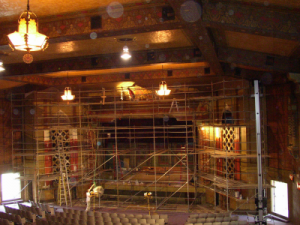
The theater during restoration in 2003. Photo: ECTPF
What his letter doesn’t say is that the group raised over $500,000 from CalPine to purchase the building and another $1 million for the restoration. Carraher and others formed the El Campanil Theatre Preservation Foundation to raise the needed funds, purchase the building from the Stamm family and has since operated the theater. (See more restoration photos, here)
“Back when we started, our budget was $1 million to get it to the point we could open,” Carraher said when reached for comment. “$750,000 came from the city’s redevelopment agency and $250,000 from individuals, corporations and foundations.”
“Our annual budget before COVID averaged between $400,000 and $500,000 which was covered by ticket sales, individuals and foundation support,” he shared. “Our last campaign, at the end of last year to ‘Keep the Curtains Open’ we raised $50,000 over three months.”
Carraher has worked tirelessly since the mid-1980’s to revitalize downtown. For nine years, he served as president of the Antioch Rivertown Business Association, helping promote the city’s historic business district, and bring back the July 4th celebration and fireworks to the waterfront. But he’s not done.
Carraher said he will continue to serve in whatever capacity is needed at the theater.
Donations to the El Campanil Theatre Preservation Foundation can be made through their website at www.elcampaniltheatre.com/donations.html.

All boys and girls ages 8 to 14 are invited to participate in the local level of competition for 2021 Knights of Columbus Free Throw Championship. The local competition will be held on January 30 and February 6 at Holy Rosary School, 25 East 15th Street in Antioch from 1-4 pm. The event will be held outdoors, one contestant at a time. In the event of inclement weather, a rain date is set for February 13.
The Free Throw Championship is sponsored annually by the Knights of Columbus, with winners progressing through local, district, and jurisdictional competitions. International champions are announced by the Knights of Columbus international headquarters based on scores from the jurisdiction-level competitions. All boys and girls ages 8 to 14 are eligible to participate and will compete in respective age divisions. Participants are required to furnish proof of age and written parental consent.
For entry forms and to make an appointment contact: Wayne Steffen 925.890.0119 or Mike Hayes 925.565.4482
Due to COVID restrictions, drop-ins may not be able to compete.
Please Spread the Word!
Council #3265 in Antioch, CA is one of 17,000 Knights of Columbus councils that make up the world’s largest Catholic fraternal service organization. Founded in 1882 to assist working-class and immigrant Catholics in the United States, today the approximately two million members of the Knights put their faith into action through a broad range of charitable causes locally, nationally and internationally with financial contributions and hands-on service.

Members of the Contra Costa Board of Supervisors and new County Administrator Monica Nino (top center) during their meeting on Tuesday, Jan. 19, 2021. Video screenshot.
By Daniel Borsuk
During the Board of Supervisors meeting on Tuesday, Jan. 19, 2021, under the questioning of District 1 Supervisor John Gioia, Contra Costa County Public Health Director Anna Roth was asked why West County has the fewest vaccine locations, five, while other districts in the county have more sites where citizens can get vaccinated.
Gioia brought up the issue on why there are far fewer vaccination sites in the Richmond and El Cerrito area that has the highest COVID-19 incidence rates in the county because of its high percentage of Black and Latino residents. He noted that there were 10 vaccination sites in East County, 10 sites in the South County (San Ramon Valley) and seven locations in Central County.
Roth said she would report back to the Board on why West County had fewest vaccination sites, but District 2 Supervisor Candace Andersen of Danville said many of the vaccination locations in her district are drug stores or grocery stores.
Gioia brought up the disparity of vaccination locations in West County after Roth had reported that the County had given about 52,000 vaccine shots since Dec. 15. She noted persons over 65 are now eligible to receive the vaccine and the vaccine is being distributed through Kaiser, Sutter and at Safeway stories. The vaccine is being distributed at 960 doses a day.
“The vaccine is giving us hope” said Contra Costa Public Health Officer Dr. Chris Farnitano. “Almost one third of the deaths in Contra Costa County were COVID-19 related.”
Velma Wilson, Kimyatta Newby Honored at MLK Ceremony
During the county’s 43rd Annual Martin Luther King Jr. Day Celebration, the Board Chair Diane Burgis presented a spectacularly produced video (see 2:34:00 mark) featuring Antioch activist Velma Wilson as the Humanitarian of the Year and Howard University student Kimyatta Newby as Student Humanitarian of the Year. (See related article)
Appoint 11 to Racial Justice Oversight Body
Supervisors approved, without discussion, the appointments of 11 residents to the Racial Justice Oversight Body, a multi-agency advisory body established by the Board of Supervisors in 2018 to oversee the implementation of the recommendations made by the Racial Justice Task Force to reduce disparities in the criminal and juvenile justice systems. The 11 new members will serve their appointment throuogh December 31, 2023.
Richmond Police Chief Bisa French will serve as the Local Law Enforcement representative. LaShanta Smith of the West Contra Costa Unified School District will serve as the school district representative. Also appointed are Tamisha Torres-Walker, an Antioch Council Member; Jeff Landau, a County public defender; Michael Pierson, an Antioch lawyer; Chala Bonner, a political education organizer; Stephanie Medley, an attorney; Ronell Ellis, an entertainment company owner; Cheryl Sudduth, a Goodwill Industries director; Apollo Sulse, a pastor of The Bay Church; and Noe Gudino, a coordinator at Ryse Youth Center.
Vehicle License Fee Hike OK’d
Without hearing any citizen objection, supervisors unanimously approved increasing an annual vehicle license fee of $1.00 for all motor vehicles registered in Contra Costa County and an additional $2.00 for commercial vehicles to provide additional funding for the county’s CAL-ID program. Used by the Contra Costa Sheriff’s Office and other law enforcement agencies in the county, the CAL-ID system provides funding for the Automated Fingerprint Identification System for persons who may be involved in driving under the influence of drugs or alcohol, vehicular manslaughter, or any combination of those and other vehicle-related crimes.
The fee increase will help cover a projected deficit of $1.1 million starting August 1, 2021.
Bay Point Fire Station Construction Contract Approved
Serving as the Contra Costa Fire Protection District Board of Directors, supervisors unanimously approved a $9,579,000 contract with C. Overaa & Co. to construct a new Fire Station 86 in Bay Point at 10 Goble Dr. even though the second lowest bidder for the project, D.L. Falk Construction Inc., with a bid of $9,714,000 had submitted an objection that was rejected by county officials.
No public objections were lodged about the contract during the Board of Directors meeting on Tuesday.
“Overaa’s bid is responsive and that County Public Works Department staff has thoroughly reviewed the bid and determined that Overaa has documented an adequate good faith effort to comply with the requirements of the County’s Outreach Program, as provided in the Project specifications. Staff recommends that the construction contract for the Project be awarded to Overaa Construction Inc., the lowest, responsible bidder, in the nearly $9,579,000, as listed in Overaa’s bid,” said the Public Works Department statement.
A third bid of $10,088,000 had been submitted by Alten Construction, Inc. of Richmond.
The new Fire Station 86 will replace the asbestos-plagued, 60-year-old fire station that is so outdated and “is too small to accommodate the needs of the modern fire service,” Contra Costa Fire Protection District Chief Lewis Broschard III wrote in a recommendation to the supervisors. “The layout consists of unconnected buildings used for various purposes. This station itself is believed to contain asbestos …This project has had several starts and stops over the decades. This fire station will serve Bay Point and the adjacent City of Pittsburg. The Pittsburg area south of Highway 4 has seen significant growth in recent years. This growth is anticipated to continue.”
Retiring EBRPD Director Doyle Recognized
Supervisors also recognized Robert Doyle for his 25 years of service at the East Bay Regional Park District, the past 10 years where he served as General Manager of the park district. Among his numerous achievements at EBRPD, Doyle was instrumental in managing the parks during the current COVID-19 crisis in which park use increased dramatically.
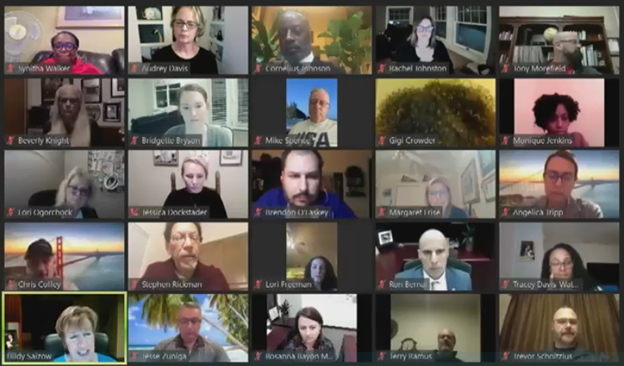
Some of the participants in and consultants for Antioch’s first of three Bridging the Gap dialogues held on Tuesday, Jan. 19, 2021 during the opening session. Councilwoman Lori Ogorchock, City Manager Ron Bernal and Assistant City Manager Rosanna Bayon Moore are also pictured. Video screenshot.
By Allen Payton
The first of three “Bridging the Gap” discussions on Antioch police, community and race relations held Tuesday night, appeared to show there is no gap that needs to be bridged between the community and police department. The first discussion, on the topic of Police Oversight, Transparency & Accountability, offered broad support for both Chief Brooks and Antioch police in general from the 75 members of the public who participated and broke into five groups for their discussions. (View video of first meeting, here)
However, participants believe there is room for some improvement in the areas of transparency and accountability, with the use of body worn cameras, and better communication, as well as some additional citizen oversight, just not “overreach”.
The format of the forums was finally, fully explained to the public with the City only broadcasting the opening and report-out, closing session on the city’s website and on Comcast Channel 24. But not the five breakout sessions. Plus, the council members did not and will not participate in the discussions due to the Brown Act state open meeting law. They could just watch and listen.
Hildy Saizow of the consulting company CAN, hired to facilitate the discussions, opened the meeting and explained the format. She then introduced Mary O’Connor, retired Assistant Chief of the Tampa, Florida Police Department, and currently an instructor with the FBI-LEED, Law Enforcement Executive Development Association, according to her LinkedIn profile.
O’Connor spoke of the various ways that cities provide oversight of their police departments, both internal and external to “ensure the complaint process is available to anyone.”
“Some oversight committees have investigative authority,” she shared. “Some have subpoena powers.”
O’Connor then shared there are concerns that oversight committees are “way above and beyond what cities can do and afford.”
“Prosecution rates increase as a result of body-worn cameras,” she stated.
Saizow then shared the ground rules for the break-out sessions.

Then those members of the public who weren’t one of the 75 who either live or work in Antioch and randomly selected to participate in the breakout sessions were shown the following screen:
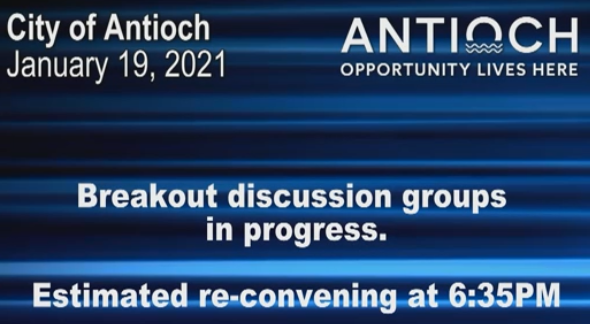
Earlier Tuesday, Mayor Lamar Thorpe, Assistant City Manager Rosanna Bayon Moore, and Public Information Officer Rolando Bonilla were asked for a list of the names of the 75 participants for each of the three forums, and when and where the reports from the break-out sessions will be made available. A response is expected sometime on Wednesday.
When the group returned for the public to watch, O’Connor spoke about her break-out session.
“The majority of our group believes the Antioch Police Department is transparent,” she said. “They know of teams that go out to the community and meet with groups. They believe the police department does a good job on promoting their events” on social media.
“Our group felt, based on their breadth of knowledge, that some accountability was necessary,” O’Connor stated. “They did cite some officers who have been in the news that they’ve heard about. There was some positive, some negatives. Generally from an accountability the citizens would like to know more about what happens in the department.”
“Our group was overwhelmingly in favor of some oversight, but were concerned about costs and where they would come from,” she said. “They supported body-worn cameras over civilian oversight.”
“As far as civilian oversight, they said they would be willing to be a part of that,” O’Connor stated. “They said there should be civilian oversight but not overreach.”
She shared that one participant in her group said, “the bodyworn cameras are long overdue,” and another said, “we can’t afford not to have bodyworn cameras.”
There was “overwhelming support for bodyworn cameras and dashboard cameras,” O’Connor pointed out.
The city needs to “provide more information to the people who come to these sessions about bodyworn cameras,” she added. “There is a lot of information out there how bodyworn cameras can have negative impact on the community.”
“There was a large part of our group that has done the Citizen’s Academy and done ride-alongs,” O’Connor concluded. “I think that pretty much wraps up our report.”
Rachel Johnston, a colleague of Saizow shared about the results from her breakout session.
“There was a lot of support for the Antioch Police Department and Police Chief Brooks,” she said. “Regarding transparency, there’s not a lot of understanding of what transparency is. But overall there is agreement that there’s always room for improvement. APD could engage in these technologies, bodyworn cameras and dashboard cameras.”
Johnston spoke of “the overlap of accountability and transparency. How can APD be accountable if they’re not being transparent?” was a question from her group. “People weren’t quite sure what the outcomes of certain incidents.”
“As for police oversight, there’s a lot of support for the police department,” Johnston shared. There was mention that “community members aren’t entitled to known everything and that civilians wouldn’t be effective, because police require a lot of training.”
She also said the members of her group said communication with the police department could be improved.
Stephen Hickman, another colleague of Saizow, shared from his group:
“Generally there was an issue raised about transparency in hiring. Antioch has come a long way with transparency,” he said. “The police and community need to meet halfway to bridge that gap.”
“On accountability there was a feeling among some that there isn’t good accountability and they cited certain cases” and “a general concern about not having information,” Hickman continued.
Regarding “bodyworn cameras, there seemed to be general agreement, but once again, wanting more information,” he stated.
On “civilian oversight, they thought that was a good idea. There was some concern about volunteers being overwhelmed. There were some of the suggestions for making things better and for building trust…making better use of social media.”
Monique Jenkins, another colleague of Saizow’s, shared about her group’s interactions on the subject matter.
“Most felt good about transparency from Chief Brooks but that there could be improvement,” she said. “Members shared support for oversight but, there was dissent kind of to what point.”
“Others wanted to start from scratch and have a group with more power,” Jenkins stated.
“On building trust, my folks felt there needed to be more community outreach in non-policing situations,” she shared.
Saizow then reported out on her group.
“The first point was around transparency. Most people felt the department is fairly transparent,” she stated. “But, they thought if there was more data, or a data dashboard that was available.”
“Most supported bodyworn cameras,” Saizow said.
“While most felt there needed to be more public input, there’s some concern about a police oversight board, because Antioch is too small and there could be overreach. But some kind of oversight.”
There was discussion around police-community engaging, and community partnership,” she said. “Other people felt that police didn’t come and engage in their particular neighborhoods…with higher percentage of poverty and minority residents.”
“Overall there was support for police and none of these changes would change community trust,” Saizow concluded.
“There are two more round tables to be held over the next month,” she stated. Those will be held on Feb. 6th and 18th and will also only allow 75 participants chosen randomly.
Following the meeting Councilman Mike Barbanica said, “I listened to the main sessions, then monitored my breakout session and was impressed with not only the support for the police department in general, but also for Chief Brooks.”
CNA will be sending out a high-level summary of Tuesday night’s meeting and a report at the end of all three which will be shared with participants.
Dialogue 2: Racial Disparities in Policing
Date: Saturday, February 6th
Time: 10:00 – 11:30 am
Discussion will focus on the disparate impact of police practices – such as recruitment and training, and use of force – on communities of color.
Dialogue 3: Police-Community Engagement
Date: Thursday, February 18th
Time: 10:00 – 11:30 am
Discussion will focus on how to improve the ways in which the police interact with young people and vulnerable communities, how police approach crime prevention, and how communities impact policing priorities.
Please check back later for any updates to this report.
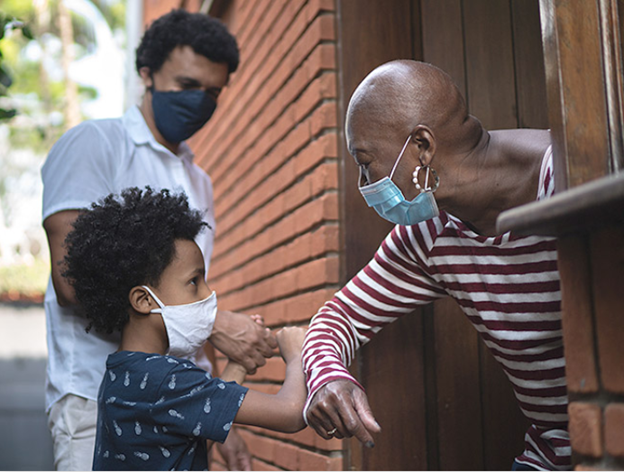
Photo courtesy of Kaiser Permanente.
In Northern California, grant funding to three grassroots and nonprofit organizations, including one in Contra Costa County, will address structures and practices that prevent communities of color from achieving good health and well-being.
By Kerri Leedy, PR and Media Relations Manager, Kaiser Permanente Northern California
 OAKLAND, CA – On Martin Luther King, Jr. Day, Kaiser Permanente, the nation’s largest integrated, nonprofit health system, announced it has awarded $8.15 million to support dozens of nonprofit and community-based organizations whose programs address systemic racism and its accompanying trauma on individuals and communities of color. These grants are part of the $25 million commitment Kaiser Permanente announced in June 2020 to promote health equity and break the cycle of racial inequities, injustices, and stresses that lead to poor health outcomes for its members and communities.
OAKLAND, CA – On Martin Luther King, Jr. Day, Kaiser Permanente, the nation’s largest integrated, nonprofit health system, announced it has awarded $8.15 million to support dozens of nonprofit and community-based organizations whose programs address systemic racism and its accompanying trauma on individuals and communities of color. These grants are part of the $25 million commitment Kaiser Permanente announced in June 2020 to promote health equity and break the cycle of racial inequities, injustices, and stresses that lead to poor health outcomes for its members and communities.
“As we reflect on the legacy of Martin Luther King Jr., I hope Kaiser Permanente is one of many voices plainly saying that there is much, much work still to be done to realize Dr. King’s ideal of an equitable society that guarantees every individual the opportunity to thrive,” said Greg A. Adams, Kaiser Permanente chairman and CEO. “I am encouraged as I see what progress is possible through organization, activism, and advocacy — and I want our support to enable future generations to follow that path to create change.”
This first set of grants, awarded to 39 organizations in eight U.S. states and the District of Columbia, support established national and regional community-based organizations led by people of color, addressing racial and social justice or trauma, including the lifelong impacts of adverse childhood experiences (ACEs).
In Northern California, a total of $975,000 in grants will help three community-based organizations work to end systemic racism and the resulting trauma experienced by people of color.
“It is fitting that we announce these grants on the day when our nation honors Martin Luther King Jr. and his vision of a just and equitable society,” said Yvette Radford, vice president, Kaiser Permanente Northern California External and Community Affairs. “These investments will support our community partners in organizing, advocating, and advancing policies and practices that foster racial equity and justice, healing, and the opportunity for every individual to thrive.”
The following Northern California organizations will each receive $325,000 over the next 24 months, as part of Kaiser Permanente’s $8.1 million investment:
“This funding sends a message of hope to our youth that they are critical to this movement and have the power to make positive change,” said Tanice Wallace, program manager for Public Health Advocates’ Faces of Resilience program, which will receive additional funding through Kaiser Permanente’s racial equity grants. “Our program helps young people understand the roots of structural racism, then we offer them tools and the opportunity to work toward racial equity in their communities.”
Among the initiatives funded is a $2 million national partnership with PolicyLink to design and scale racial equity strategies, projects, and campaigns. The core issues PolicyLink addresses include housing justice, water equity and climate resilience, corporate racial equity, and reducing inequality.
“To truly honor Dr. King, we must build a just and fair society where all can participate, prosper, and reach their full potential. Sadly, due to us not heeding Dr. King’s charge, more than 100 million people – 1 in 3 Americans – still live in or near poverty,” said Michael McAfee, president and CEO of PolicyLink. “Our partnership with Kaiser Permanente will support creating anti-racist practices and policies inside the organization, within Kaiser Permanente’s vast network, and in the broader society. This project will help to ensure that all people in America — particularly those who face the burdens of structural racism – participate in a just society, live in a healthy community of opportunity, and prosper in an equitable economy.”
As part of this partnership, PolicyLink will also play a role in working with organizations receiving grants – convening, engaging, and mobilizing regional grantees to catalyze learning and action communities. Kaiser Permanente and PolicyLink will evaluate the outcomes of funded programs, with input from a panel of national racial justice and trauma experts, to track and measure overall progress. The grants will be distributed through Kaiser Permanente’s fund at the East Bay Community Foundation.
In addition, in celebration of Martin Luther King Jr. Day, an estimated 1,700 Kaiser Permanente employees in Northern California took part in the organization’s 17th Annual MLK Day of Service. Due to COVID-19, all volunteering was done safely and virtually. Projects ranged from making calls and writing letters to seniors and others who are isolated by the pandemic to creating blankets, masks, and wellness journals for people in need.
Kaiser Permanente Northern California is also donating a 1,000-square-foot mural to the Black Cultural Zone at Oakland’s Liberation Park where it will soon be permanently installed. Two local Oakland artists created the dynamic and colorful piece of art, which depicts images that reflect the Black community and culture.
About Kaiser Permanente
For 75 years, Kaiser Permanente has been committed to shaping the future of health and health care — and helping our members, patients, and communities experience more healthy years. We are recognized as one of America’s leading health care providers and not-for-profit health plans. Since July 21, 1945, Kaiser Permanente’s mission has been to provide high-quality, affordable health care services and to improve the health of our members and the communities we serve. We currently serve 12.4 million members in eight states and the District of Columbia. Care for members and patients is focused on their total health and guided by their personal Permanente Medical Group physicians, specialists and team of caregivers. Our expert and caring medical teams are empowered and supported by industry-leading technology advances and tools for health promotion, disease prevention, state-of-the-art care delivery and world-class chronic disease management. Kaiser Permanente is dedicated to care innovations, clinical research, health education and the support of community health.
The following Antioch Unified School District 2021 Rev. Dr. Martin Luther King, Jr. Art & Essay Award recipients presented their works during the online event, held Monday afternoon.
Elementary – Art
1st Place: Calli West, 5th Grade Belshaw Elementary
2nd Place: Bryce West, 3rd Grade Belshaw Elementary
Middle School – Art
1st Place: A’nyja Morton, 8th Grade Orchard Park School
2nd Place: Blake West, 7th Grade Park Middle School
3rd Place Tie: Kylie Wisely, 8th Grade Holy Rosary
Natalia Cortez, 7th Grade Orchard Park School
Middle School – Essay
1st Place: A’nyja Morton, 8th Grade Orchard Park School
2nd Place: Ke’Ona Jones, 8th Grade Black Diamond Middle School
3rd Place: Lily Bastedo, 8th Grade Black Diamond Middle School
High School -Art
1st Place: Daxibel Oliveras, 10th Grade Deer Valley High School
2nd Place: Juliana Medina, 9th Grade Deer Valley High School
3rd Place: Eduardo Artiga Sanchez, 9th Grade Dozier Libby Medical High School
High School – Essay
1st Place: Olumese Oaiya, 12th Grade Deer Valley High School
2nd Place: Dennis Gavrilenko, 12th Grade Deer Valley High School
3rd Place: Ieshia Perez, 12th Grade Dozier Libby Medical High School

Artwork by A’nyja Morton, 8th grader at Orchard Park School winner of the Reggie Moore Memorial Family Community Service. Video screenshot.
Reggie Moore Memorial Family Community Service Award
1st Place: A’nyja Morton, Orchard Park School
2nd Place: Olumese Oaiya, Deer Valley High School
3rd Place: Ke’Ona Jones, Black Diamond Middle School
4th Place Tie: Ieshia Perez, Dozier Libby Medical High School
Dennis Gavrilenko, Deer Valley High School
Honorable Mention:
Jeremiah Shirden-Bean, Antioch High School
Cristina Craven, Dozier Libby Medical High School
Nicole Orozco, Deer Valley High School
Robyn Page, Deer Valley High School

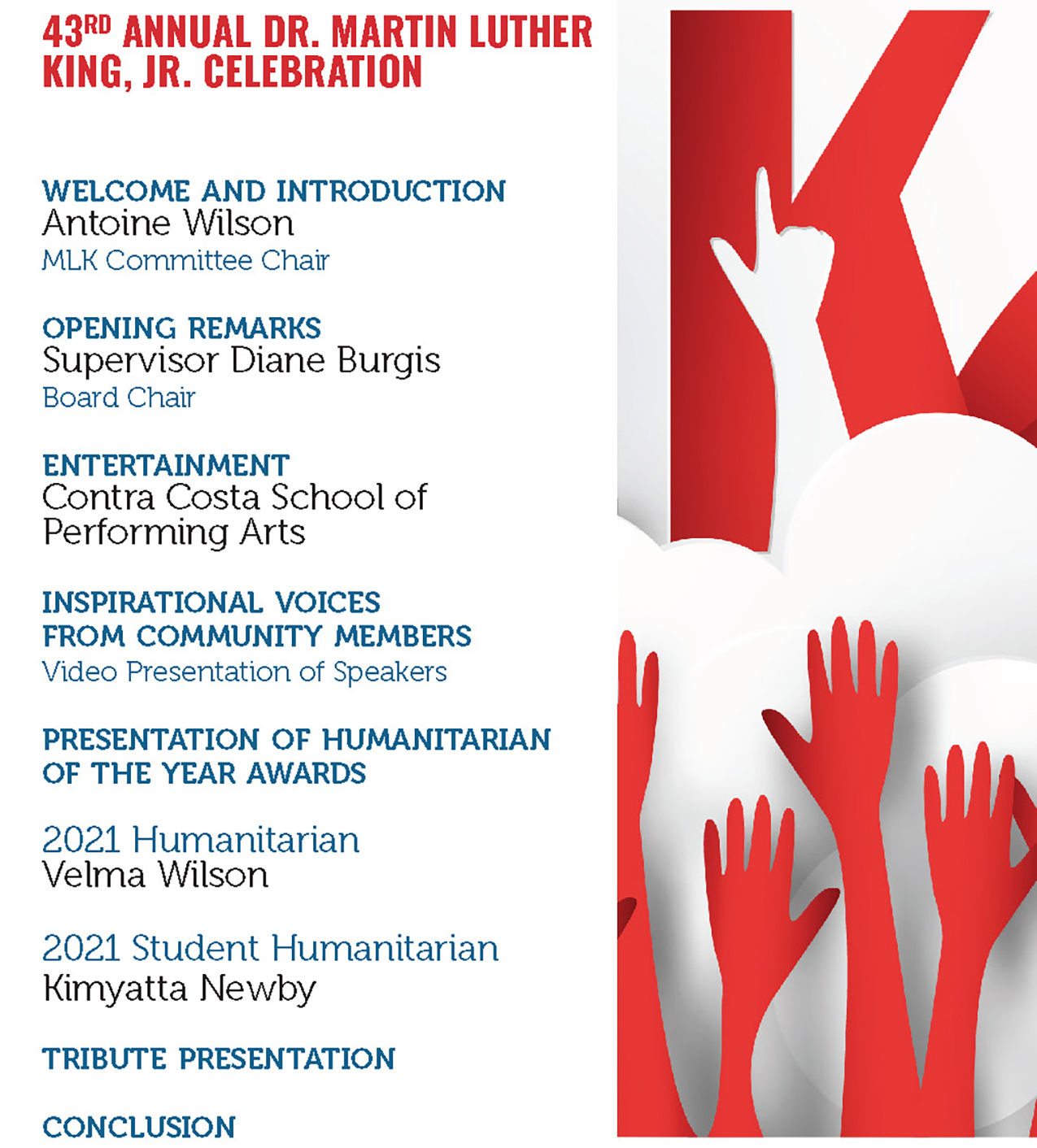
For the complete event program click, here.